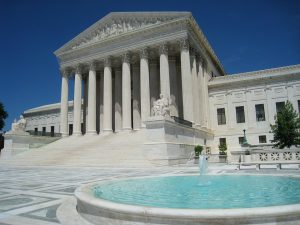By Yves Poirmeur
Translation: Lawrence Myers
Passage au crible n°114

Pixabay
On June 3, 2014, BNP Paribas concluded a final agreement with the American justice system. Whereby, after having pled guilty, it accepted to pay an 8.834 billion dollar fine (6.5 billion euros). For having used American money in transactions with countries under embargo by the United States. Equally, it is prohibited from doing any clearing in dollars on behalf of oil and gas traders. Otherwise, BNP had to let go of thirteen of its managers, including those at its Swiss branch, as all of them were implicated in disputed payments. The bank also had to put into place a structure designed to monitor the respect of American legislation when its in dollars must be carried out in New York. This is the conclusion of the proceedings begun by the New York prosecutor who suspected this institution – like other European establishments – of violating unilaterally imposed embargos by the United States against Cuba, Iran and Sudan, countries considered “enemies” or “supporting terrorism”, between 2002 and 2010 (Foreign Assistance Act, (1961); Cuban Liberty and Democracy Solidarity (Libertrad) Act, (the Helms-Burton Act), (1996); Iran and Libya Sanctions Act, (law called D’Amato-Kennedy), 1996). This agreement results in the payment of the highest fine ever inflicted on a foreign bank for transactions that – although irregular in American law – were not so in French law and did not infringe on sanctions which were supposedly decided by the UN Security Council, to maintain peace (UN Charter, Ch. VII).
> Historical background
> Theoretical framework
> Analysis
> References
While States may possess exclusive jurisdiction over their national territory for acts of coercion because of the sovereignty principle and to its corollary – the non-intervention principle – international law also recognizes their freedom of principle. In reality, the Permanent Court of International Justice estimated, in the famous Lotus case (PCIJ, September 7, 1927, France vs. Turkey), that the limitations on their independence could not be presumed. This presumption allows them to exercise their normative competency to determine localized situations either completely or in part on their territory, and abroad, those that entail a person bearing their nationality, that involve their fundamental interests or else that detract from universal values. However, as a state does not have coercive power within the jurisdiction of another state, it cannot impose the respect of certain behaviors that it proscribes without the other’s consent (IJC, April 9, 1949, Corfu Channel incident, United Kingdom vs. Albania). The application of extraterritorial interstate norms thus clashes rather classically with the impossibility of reaching their recalcitrant recipients, with the cooperation of the countries that harbor them. This is notably the case for measures – embargos, boycotts, freezing of financial assets, prohibiting managers to travel – decided unilaterally by a state in order to oblige another or a foreign entity to change its practices. The success of most of these containment operations depends on their application by foreign companies whose assistance proves necessary to ensure their imperviousness. Attempts to force their respect are often blocked by the impossibility of imposing sanctions in cases when they are breached; the state actor is then reduced to propelling the consequences of violation onto its own sphere of sovereignty. In this way, the enormity of the penalties afflicting BNP Paribas appear to be revelatory of an increase of the coercive power of the United States and of a repressive paradigm shift. By showing itself capable of sanctioning foreign firms whose activities abroad infringe upon its laws, the US substantially raises the cost of the violation of embargos that it put in place. In this way, it reinforces the level of effectiveness of the legal instruments of its foreign policy.
1. The structural power of the United States. If the deterritorialization of the economy has reduced the ability of state intervention on the operators of global markets, the United States has retained its capacity in this domain. From now on, it is able to weigh on economic agents more than they are able to influence it. Exploiting the vital necessity of transnational companies to trade on its domestic market or to accomplish different activities on its territory, the US succeeds in linking these companies to its jurisdiction under the sovereign threat to restrict access or else to deny the exercise, for which its cannot take the risk.
2. Transnational exercise of judicial constraint in the service of American hard power. Thanks to its economic and financial hegemony as well as the preponderance of its money, the United States manages to place transnational firms under the influence of its law. With these companies, it enlarges the scope of its extraterritorial jurisdiction intervention. Not needing the assistance of other countries in order to force its respect, but only the collaboration of firms in the hold of its legal nets, the US thus exercises a regulatory power of transnational scope and has unequaled coercive power.
Mobilizing all of the resources of its structural power, the United States has diversified the objects of attachment of foreign companies to its jurisdiction – exercise of activities on its territory, stock notation, use of digital platforms under American law…- and transformed its economic dominance into legal hegemony. In the BNP Paribas case, it is through transactions in US currency, at best tenuous, that it made these international exchanges. In reality the United States considers that all the payments in its currency must be conform to its legislation. Consequently, disputed transactions having been made in American dollars and compensated by the New York branch of BNP Paribas, American justice considered itself competent for prosecution. However, it would not have been able to take these actions if another money had been used for these payments.
Risking the loss of its operating license, or of being prohibited from offsetting transactions in dollars and having to face a long trial with an uncertain outcome before being struck by criminal sanctions, BNP Paribas ultimately preferred to cooperate with legal authorities. For this reason, it participated in its own incrimination by offering proof of its guilt. Rather than resisting them and going to trial, it sought to take advantage of the American system of negotiated justice, which allows one to make an arrangement or deal and to terminate the proceedings by limiting the transaction sanctions. In other words, the bank submitted itself to the procedural mechanisms of American law. It is in this way that the bank had to 1) carry out an internal investigation at its own cost in all of its branches by following the instructions given by legal authorities, 2) negotiate the amount of the fine to be paid, 3) promise to secure an internal inspector or monitor charged with the mission of verifying that it will in the future confirm to American legislation and finally, 4) institutionalize a procedure to this end. This judicial mechanism is perfectly adjusted to the globalization of exchanges. It also appears adapted to the dispositions of companies that are structurally given to maximize their profits by carrying out a cost/benefits analysis that incorporates legal risks. Its effectiveness depends on the establishment of a set of institutions having a means of investigation and of negotiation in order to pilot the program. Directed by the Department of Justice and by US prosecutors – in this case the District Attorney of New York – naturally the investigations mobilize the FBI (Federal Bureau of Investigation). The investigations benefit from the support of specialized regulatory agencies such as OFAC (Office of Foreign Asset Control) dedicated to the management of a program of economic sanctions and the SEC (Securities and Exchange Commission) charged with the surveillance of stock markets.
While since the Cold War the United States has not stopped developing its extraterritorial legal arsenal establishing economic sanctions to isolate certain countries – Cuba, North Korea – or else to fight against terrorism – Iran, Syria, Libya, Sudan –, this repressive model insidiously converts transnational companies into auxiliaries of American diplomacy with which other democracies are not always in agreement (case of France and the Cuba embargo). As this legal strategy not only concerns programs of economic penalties, but also spreads to the fight against corruption and the repression of stock market offenses, it makes American law into the primary regulator of globalization. In so doing, this United States is allowed to benefit from the financial windfall of the fines that it imposed. In this case, it is a question of a sort of annuity of legal domination. Taken globally, it undeniably consecrates its hegemony.
Garapon Antoine, Servan-Schreiber Pierre (Éds.), Deals de justice. Le marché américain de l’obéissance mondialisée, Paris, PUF, 2013.
Strange Susan, Le retrait de l’État. La dispersion du pouvoir dans l’économie mondiale, Paris, Éd. Du Temps Présent, 2011.
Waltz Kenneth, Theory of International Society, Addison Wesley, Reading MA, 1979.




